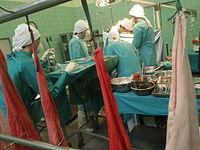
Photo from wikipedia
Quality takes center stage in editing and publishing Transplant International. Scientific quality is for us the pivotal factor in deciding which manuscripts to publish. The peer-review process is the instrument… Click to show full abstract
Quality takes center stage in editing and publishing Transplant International. Scientific quality is for us the pivotal factor in deciding which manuscripts to publish. The peer-review process is the instrument that is essential for achieving the goal of selecting the papers of highest quality. In this regard, we are grateful for the hard work of all our reviewers and our team of editors. In particular, we welcome Christian Toso, MD, PhD (Geneva, Switzerland), Ondrej Viklicky, MD, PhD (Prague, Czech Republic), Gabriel C. Oniscu, MD (Edinburgh, UK), Lionel Rostaing, MD, PhD (Grenoble, France), Vijay Kher, MD, DM (Gurgaon, India) and Wai H Lim, MBBS, PhD (Perth, Australia) who have recently joined us as Associate Editors. Given the critically important role of the peer-review process, assessing its quality appeared important to us. Georg Heinze, Transplant International’s Statistical Editor since 2015, took on the task and analyzed the peerreview process of Transplant International. The paper reporting the results of his detailed analysis is published in this issue of the journal [1]. In brief, the paper concludes that the peer-review process at Transplant International was successful in selecting manuscripts with a high scientific impact in the future. We interpret the recent rise of the Impact Factor (now 3.196) and the increase in submissions (+6.5% over the previous year) as a result of this strictly quality-oriented review process. While these trends are re-assuring, we will keep working on further improvements and welcome any input and feedback you might have.
Journal Title: Transplant International
Year Published: 2019
Link to full text (if available)
Share on Social Media: Sign Up to like & get
recommendations!